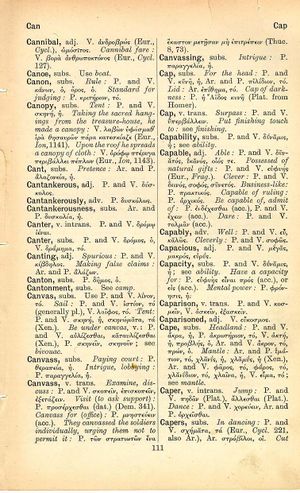canon: Difference between revisions
Φιλοσοφίαν δὲ τὴν μὲν κατὰ φύσιν, ὦ Βασιλεῦ, ἐπαίνει καὶ ἀσπάζου, τὴν δέ θεοκλυτεῖν φάσκουσαν παραίτου. → Praise and revere, O King, the philosophy that accords with nature, and avoid that which pretends to invoke the gods. (Philostratus, Ap. 5.37)
(6_3) |
|||
| Line 7: | Line 7: | ||
}} | }} | ||
{{Lewis | {{Lewis | ||
|lshtext=<b>cănon</b>: ŏnis, m. (acc. canona, Plin. 34, 8, 19, § 55;<br /><b>I</b> acc. plur. canonas, Aus. Ep. 136; in Cic. Fam. 16, 17, 1, used as a Greek [[word]]), = [[κανών]] [[κάννα]], [[κάνη]]>, a [[reed]], [[cane]].<br /><b>I</b> A marking or measuring [[line]]; [[hence]], a [[rule]], [[canon]], [[model]] (cf. Lidd. and Scott, under [[κανών]]>).—<br /><b>II</b> Esp.<br /> <b>A</b> A [[wooden]] [[channel]] in hydraulic instruments, Vitr. 10, 13 Rod.—<br /> <b>B</b> Under the emperors, an [[annual]] [[tribute]], established by [[law]], in [[grain]], [[gold]], [[silver]], [[clothing]], etc., Spart. Sev. 8; Lampr. Elag. 27.—<br /> <b>C</b> In eccl. Lat., a [[catalogue]] of [[sacred]] writings, as admitted by the [[rule]], the Canon, Aug. Doctr. Christ. 2, 8; Hier. Prol. Gal. Aug. Civ. 17, 24; 18, 38; cf. Isid. Orig. 6, 15 and 16.—<br /> <b>D</b> Also in [[late]] Lat., from [[their]] [[shape]], in | |lshtext=<b>cănon</b>: ŏnis, m. (acc. canona, Plin. 34, 8, 19, § 55;<br /><b>I</b> acc. plur. canonas, Aus. Ep. 136; in Cic. Fam. 16, 17, 1, used as a Greek [[word]]), = [[κανών]] [[κάννα]], [[κάνη]]>, a [[reed]], [[cane]].<br /><b>I</b> A marking or measuring [[line]]; [[hence]], a [[rule]], [[canon]], [[model]] (cf. Lidd. and Scott, under [[κανών]]>).—<br /><b>II</b> Esp.<br /> <b>A</b> A [[wooden]] [[channel]] in hydraulic instruments, Vitr. 10, 13 Rod.—<br /> <b>B</b> Under the emperors, an [[annual]] [[tribute]], established by [[law]], in [[grain]], [[gold]], [[silver]], [[clothing]], etc., Spart. Sev. 8; Lampr. Elag. 27.—<br /> <b>C</b> In eccl. Lat., a [[catalogue]] of [[sacred]] writings, as admitted by the [[rule]], the Canon, Aug. Doctr. Christ. 2, 8; Hier. Prol. Gal. Aug. Civ. 17, 24; 18, 38; cf. Isid. Orig. 6, 15 and 16.—<br /> <b>D</b> Also in [[late]] Lat., from [[their]] [[shape]], in plur.: cănŏnes, um, cannon: et [[illic]] figere gunnas suas, quas [[Galli]] canones vocant, quibus validius villam infestare posset, Thom. Walsingham in Henry V. p. 398. | ||
}} | }} | ||
Revision as of 09:23, 13 August 2017
English > Greek (Woodhouse)
subs.
Rule: P. and V. κάνων, ὁ, ὅρος, ὁ.
Standard for judging: P. κριτήριον, τό.
Latin > English (Lewis & Short)
cănon: ŏnis, m. (acc. canona, Plin. 34, 8, 19, § 55;
I acc. plur. canonas, Aus. Ep. 136; in Cic. Fam. 16, 17, 1, used as a Greek word), = κανών κάννα, κάνη>, a reed, cane.
I A marking or measuring line; hence, a rule, canon, model (cf. Lidd. and Scott, under κανών>).—
II Esp.
A A wooden channel in hydraulic instruments, Vitr. 10, 13 Rod.—
B Under the emperors, an annual tribute, established by law, in grain, gold, silver, clothing, etc., Spart. Sev. 8; Lampr. Elag. 27.—
C In eccl. Lat., a catalogue of sacred writings, as admitted by the rule, the Canon, Aug. Doctr. Christ. 2, 8; Hier. Prol. Gal. Aug. Civ. 17, 24; 18, 38; cf. Isid. Orig. 6, 15 and 16.—
D Also in late Lat., from their shape, in plur.: cănŏnes, um, cannon: et illic figere gunnas suas, quas Galli canones vocant, quibus validius villam infestare posset, Thom. Walsingham in Henry V. p. 398.

